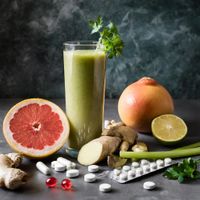Micronutrients and Vitamins
Vitamin A - Fat-Soluble
Benefits: Vision, immune system regulation, skin/mucous membrane health, supports wound healing, reproduction, bones, teeth
Food Sources: Preformed Vitamin A sources (Retinol): liver, fish, dairy products, eggs; foods high in beta-carotene: carrots, leafy greens, sweet potatoes, pumpkin, kale, spinach, lamb's lettuce
Vitamin B1 (Thiamine) - Water-Soluble
Benefits: Energy metabolism: conversion of carbohydrates into energy for mental and physical activities (concentration and mental performance), maintenance of nerve and heart muscle tissue and growth, nerve function (formation of neurotransmitters), regeneration of the nervous system after illnesses or trauma, involved in the production of serotonin (happiness hormone), involved in the synthesis of DNA and RN
Food Sources: Nutrient-dense foods: whole grains (barley, oats, rice, quinoa, spelt), legumes (lentils, peas, black and white beans), leafy greens (lamb's lettuce, kale, fennel, spinach), or lean meats, soy, nuts, sesame, pork, fish
Vitamin B2 (Riboflavin) - Water-Soluble
Benefits: Helps convert food into energy – supports healthy hair, skin, blood, and brain, physiological activation and biosynthesis of Vitamin D, detoxification of homocysteine, cellular immune response, anti-inflammatory effects (reduction of IL-6, TNF-alpha, IL-1β)
Food Sources: Dairy products, meat, green leafy vegetables, fortified wheat, oysters
Vitamin B4 (Choline) - Water-Soluble
Benefits: Important for the synthesis of the neurotransmitter acetylcholine in relation to brain function, memory performance, cognitive functions, and muscle control, supports the transport of fats from the liver, structural integrity of cell membranes
Food Sources: Whole grains, fish, meat, eggs
Vitamin B6 (Pyridoxine) - Water-Soluble
Benefits: Conversion of food into energy, formation of red blood cells, synthesis of neurotransmitters, support of healthy methylation processes, supports the immune system, improves sleep, regulates various hormones (e.g., mood)
Food Sources: Poultry/chicken, fish, tofu, beef liver, bananas, potatoes, legumes, nuts, watermelon, seeds
Vitamin B9 (Folate) - Water-Soluble
Benefits: Plays a crucial role in the growth and development of the human body, such as in infancy and pregnancy (formation of maternal tissue and reduction of the risk of neural tube defects in the unborn child) - cell division and growth, metabolic processes: formation of DNA and RNA, involvement in the synthesis of white and red blood cells, involvement in amino acid metabolism (conversion of amino acids into proteins for muscle building and tissue repair), mental health: synthesis of neurotransmitters / signal transmission between nerve cells, helps reduce fatigue (European Commission, 2016), contributes, together with Vitamin B6 and Vitamin B12, to the easier breakdown of the harmful amino acid homocysteine in the conversion to methionine.
Food Sources: Apples, avocados, kiwis, melons, dried apricots, spinach, kale, carrots, green lettuce, asparagus, sauerkraut, sprouts, papayas, leeks, oranges, broccoli, tomatoes, legumes (kidney beans, lentils, chickpeas), eggs (yolk), liver (beef, veal, lamb, duck), seeds (wheat germ), nutritional yeast (CIQUAL Data, Anses 2017) (1)
Vitamin C (Ascorbic Acid) - Water-Soluble
Benefits
A powerful antioxidant and essential nutrient for maintaining health.
- Necessary for the growth and repair of body tissues such as skin, bones, and cartilage
- Cofactor for collagen biosynthesis, carnitine and catecholamine metabolism, and the absorption of iron from food
- Neutralizes free radicals and toxins
- Reduces inflammatory responses, including sepsis syndrome
- Stabilizes Vitamin E and folic acid and improves iron absorption, i.e., helps our body absorb iron from plant-based foods
- In collagen, the proline residues of procollagen require Vitamin C for hydroxylation (important for the formation of the triple helix of mature collagen). Fundamental importance for: skin, tendons, ligaments, and blood vessels. Vitamin C deficiency leads to scurvy and manifests in bleeding, hyperkeratosis, and hematological abnormalities.
- Strengthens our immune system to fight off infections and diseases
- Genetic predisposition can affect Vitamin C metabolism (the ability to absorb and utilize Vitamin C in the body can be impaired, increasing the risk of Vitamin C deficiency) and can influence and promote the risk of certain diseases.
Food Sources: Fresh and, if possible, natural foods like oranges, kiwis, strawberries, citrus fruits, berries, broccoli, bell peppers, kale, potatoes, tomatoes, sulfur-rich vegetables like onions, garlic, and cruciferous vegetables, supplements such as buffered Vitamin C
Note: Vitamin C is heat and light sensitive! Distribute your Vitamin C intake evenly throughout the day. Our body cannot store Vitamin C for an extended period.
Please note: Improve your iron absorption by combining iron-rich foods with fruits and vegetables high in Vitamin C, such as citrus fruits, strawberries, green leafy vegetables, bell peppers, tomatoes. Avoid consuming dairy products and calcium-rich foods at the same time, as they can inhibit iron absorption. Smoking, chronic stress, and excessive alcohol consumption negatively affect Vitamin C levels. Ensure you practice sufficient stress management techniques like meditation, exercise, and mindfulness exercises. Other risk factors for Vitamin C deficiency include food allergies, age (elderly), cancer, anorexia, inflammatory bowel disease, gastroesophageal reflux, fad diets, unsupplemented parenteral nutrition, medication intake (e.g., aspirin, tetracyclines, indomethacin, corticosteroids, and oral contraceptives), renal cell carcinoma, dialysis (due to the leaching of water-soluble Vitamin C in renal failure), liver transplantation. Maintaining a balanced diet and healthy lifestyle can help mitigate these risks and ensure adequate Vitamin C levels for overall health.
Vitamin D - Fat-Soluble
Umbrella term for calciferols. The most important ones are Vitamin D2 (Ergocalciferol) and Vitamin D3 (Cholecalciferol). Both must be converted in the liver into the inactive form of Vitamin D (25-Hydroxyvitamin D or Calcifediol), and then further converted in the kidneys into their active form (Calcitriol or 1,25-Dihydroxyvitamin D (1,25(OH)2D) with hormone-like properties. Vitamin D is usually insufficiently absorbed through food, so exposure to sunlight is a crucial factor that affects Vitamin D levels (BUT be cautious with intensive sunbathing - skin cancer risk). Not only in winter should we ensure that we provide our bodies with enough Vitamin D, but vegans and vegetarians should also regularly monitor their Vitamin D levels and consider Vitamin D3 supplements. Whether our body produces enough Vitamin D can be influenced by various genetic variants, which have a decisive influence on the function of the enzymes involved in Vitamin D metabolism (low Vitamin D levels).
Cholecalciferol (Vitamin D3) is produced in our skin under the influence of UVB radiation from the precursor 7-dehydrocholesterol and is only absorbed to a small extent through our diet. The extent to which Vitamin D synthesis can occur is strongly influenced by season and time of day, altitude, air pollution/environmental factors, xenobiotics/pollutants, hindrances to cutaneous synthesis: sunscreen, skin pigmentation (dark skin color), age (elderly, infants), latitude (Wacker and Holick, 2013). Genetics, chronic diseases, dependency on care, religious or cultural reasons for covering the body completely, and viral infections (EBV, COVID-19, etc.) also play a decisive role.
Benefits
- Regulation in terms of the absorption of calcium and phosphate levels from the intestine (bone metabolism, i.e., healthy bones/bone mineralization and teeth)
- Prevention of rickets in children
- Modulation of adaptive and innate immunity, e.g., inflammatory response/anti-inflammatory/immune stabilization
- Vitamin D is required for neuromuscular functions, cell growth
- Cardiovascular health and vascular protective effect
- Optimal Vitamin D levels reduce oxidative stress (ROS, NLRP3, mitochondrial respiratory chain, modulation of systemic inflammation)
- Important role in the endocrine, hematopoietic, and neuromuscular systems
- Involved in the formation of proteins and the regulation of a variety of genes
- An appropriate Vitamin D level showed a significant protective effect against respiratory infections
- Improvement of gut microbiome due to inadequate nutrient absorption in the intestine
- Possible improvement of vaccine responses
- There is also a correlation between the risk of a severe course of coronavirus (COVID-19) and the 25(OH)D status (e.g., disturbances in glucose metabolism, hyperinflammation syndrome, cardiovascular risk factors (thromboembolic), renin-angiotensin-aldosterone system, fibrosis, inflammation/cytokine production, lung damage. Observational studies showed that Vitamin D deficiency significantly increases the risk of COVID-19, meaning that an optimal Vitamin D level is crucial for the disease course (IL6, TNF alpha, cytokines, regulation of Th1/Th17 Th2, cell damage). Anti-inflammatory effect.
Note that some medications can negatively affect Vitamin D metabolism, such as cytostatics and antiepileptics.
Magnesium and Vitamin B2 are also needed for the conversion and activation of Vitamin D.
Food Sources: Fish oil, fatty fish (salmon, mackerel, herring, eel, sardine, cod), seafood, dairy products (Edam cheese), egg yolk, liver, meat
Q10 (Coenzyme Q10)
Benefits
Energy Production
- Coenzyme Q10 plays a crucial role in energy production within cells, especially in the mitochondria. It is an essential component of the electron transport chain, leading to ATP synthesis, the main energy source for the body.
Antioxidative Properties
- Q10 acts as a powerful antioxidant, helping to neutralize free radicals and prevent oxidative damage in cells. This can help slow down the aging process and reduce the risk of chronic diseases.
Heart Health
- Coenzyme Q10 can support heart health by improving the energy supply to the heart and acting as an antioxidant. It can also aid in the treatment of heart failure and other heart conditions.
Muscle Function
- Q10 can improve muscle function and reduce muscle fatigue, particularly in individuals with certain health conditions, such as fibromyalgia or chronic fatigue syndrome (CFS).
Immune System
- It supports the immune system by enhancing the activity of immune cells and helping the body fend off infections.
Food Sources
Meat and Fish
- Offal: Heart, liver, and kidneys contain high amounts of Q10.
- Fatty Fish: Salmon, mackerel, tuna, and sardines are good sources of Q10.
Plant-Based Sources
- Nuts and Seeds: Peanuts, sesame seeds, pistachios, and sunflower seeds contain moderate amounts of Q10.
- Vegetables: Broccoli, spinach, cauliflower, and carrots have lower amounts of Q10 but are still beneficial.
- Whole Grains: Oats, barley, and wheat germ are also sources of Q10.
Oils: Soybean oil, corn oil, and olive oil contain Q10 and can contribute to daily intake.
Before you hastily and excessively resort to high-dose supplements, always check whether there is actually a Vitamin D deficiency or insufficiency, because more is not always better. Extremely high-dose Vitamin D supplements should only be taken under close and strict medical supervision (kidney and calcium levels / creatinine, parathyroid hormone (PTH) and calcium in the urine) – this also carries a high risk, as many do not ensure sufficient water intake and a low-calcium diet, which can severely damage the kidneys. Too much calcium is absorbed through the intestines (calcium absorption can quickly double), meaning our body incorporates it into the bones or it must be excreted via the kidneys. This, in turn, can lead to dangerous vascular or kidney calcifications, with potentially life-threatening consequences.
Always take enough time to thoroughly check providers and supplements and consult your doctor, as incorrect supplementation can carry enormous health risks.
This applies to all supplements.
Blueberry the healthy powerfruit
A true source of (poly)phenols and other bioactive compounds.
The long-term, targeted, and non-overdosed consumption of blueberries has, in my case (presence of risk factors), led to an improvement in markers of vascular function.
My personal successes through targeted supplementation with (organic) blueberries and (organic) blueberry powder
In my personal case, it is very likely that the circulating phenolic blueberry metabolites have significantly improved vascular function and successfully reduced severe inflammation. Furthermore, after targeted and NON-overdosed supplementation with blueberries, I also experienced significantly fewer heart rhythm disturbances. This positive vascular effect is indeed positive to see after a longer, consistent (daily) supplementation in my case and seems to offer cardioprotective advantages.
Studies
Pubmed - ScienceDirect - CanadianSciencePublishing - Scopus - MDPI
Evidence-based Health Benefits of Blueberries
PMID: 22564864: Effects of blueberries on recovery from eccentric exercise-induced muscle damage - Auswirkungen Blaubeeren auf die Erholung bei durch exzentrisches Training verursachte Muskelschäden
PMID: 36972800: vascular function and cognitive performance - Gefäßfunktion und kognitive Leistung
PMID: 36150681: systematic review of human intervention studies: evidence improvement of markers of vascular function - systematische Überprüfung von Humaninterventionsstudien: Evidenz Verbesserung von Markern der Gefäßfunktion
PMID: 31136659: Blueberries improves biomarkers of cardiometabolic function - metabolic syndrome - Heidelbeeren verbessern Biomarker der kardiometabolischen Funktion - metabolisches Syndrom
PMID: 31698695: improvement in cognitive function - young healthy adults - Verbesserung kognitive Funktion - junge gesunde Erwachsene
PMID: 17602170: Effects of bilberry juice intervention on multiple genetic polymorphisms - Effekte Intervention mit Blaubeersaft - Auswirkungen multipler genetischer Polymorphismen
PMID: 31776441: cardiovascular disease prevention - Vorbeugung von Herz-Kreislauf-Erkrankungen
PMID: 20660279: Regulation of cholesterol levels: in this study, consuming 50 g of blueberries per day was shown to reduce oxidized LDL by 27% - Regulation Cholesterinspiegel: ein Konsum von 50 g Blaubeeren pro Tag senkte in dieser Studie nachweislich das oxidierte LDL um 27%
PMID: 32337475: positive effects on cardiometabolic health parameters (men with type 2 diabetes over 8 weeks) - positive Auswirkungen auf kardiometabolische Gesundheitsparameter (Männern mit Typ-2-Diabetes über 8 Wochen)
PMID: 20047325: Improvement in learning and memory tests (cerebral function) in older people (consumption of blueberry juice for 2 months) - Verbesserungen bei Lern- und Gedächtnistests (Gehirnfunktion) bei älteren Menschen (Konsum: von Blaubeersaft über 2 Monate)
Anthocyanin plasma metabolites: major mediators of vascular bioactivity (enhancers of flow-mediated dilation) - Anthocyan-Plasma-Metaboliten: Hauptmediatoren der vaskulären Bioaktivitäten (Verbesserungen der durchflussvermittelten Dilatation)
Blueberries improve endothelial function - Blaubeeren verbessern die Endothelfunktion (A Randomized, Double-Blind, Placebo-Controlled Clinical Trial)
Increase in the number of natural killer cells after 6 weeks of consuming blueberry powder - Erhöhung der Anzahl der natürlichen Killerzellen durch den 6 wöchigen Verzehr von Heidelbeerpulver
Metabolic syndrome: blueberries reduce cardiovascular risk factors in overweight men and women - Metabolisches Syndrom: Blaubeeren senken kardiovaskuläre Risikofaktoren bei übergewichtigen Männern und Frauen
Improvement of insulin sensitivity in overweight, insulin-resistant men and women through bioactive substances in blueberries - Verbesserung der Insulinempfindlichkeit bei übergewichtigen, insulinresistenten Männern und Frauen durch Bioaktive Stoffe in Blaubeeren
After chronic blueberry supplementation: improved task-related brain activation and resting-state perfusion in healthy older adults - Nach chronischer Blaubeersupplementierung: Verbesserte aufgabenbezogene Gehirnaktivierung und Ruheperfusion bei gesunden älteren Erwachsenen
Improvement of blood pressure and arterial stiffness in postmenopausal women with pre- and stage 1 hypertension with daily blueberry consumption - Verbesserung des Blutdruck und der arteriellen Steifigkeit bei Frauen nach der Menopause mit Prä- und Hypertonie (Stadium 1) bei täglichem Verzehr von Blaubeeren (randomisierte, doppelblinde, placebokontrollierte klinische Studie)
This contribution was written by Birgit Bortoluzzi, the creative founder of the “University of Hope” – an independent knowledge platform dedicated to resilience, education, and compassion in a complex world.
Source References
(1) Ciqual – ANSES (2017) Nutritional Composition Table of Food Products. French Agency for Food, Environmental and Occupational Health & Safety (ANSES) Available at: https://ciqual.anses.fr , (Retrieved: September 2, 2024)
(2) Guilland, J.-C. et al. (2007) Les Vitamines – Booklet No. 41 (Bioforma Cahier No. 38). Published by Bioforma, Société Jean-Bernard Médecine. PDF: https://www.sjbm.fr/images/cahiers/2007-Bioforma-38-Les%20Vitamines.pdf, (Retrieved: September 2, 2024)






